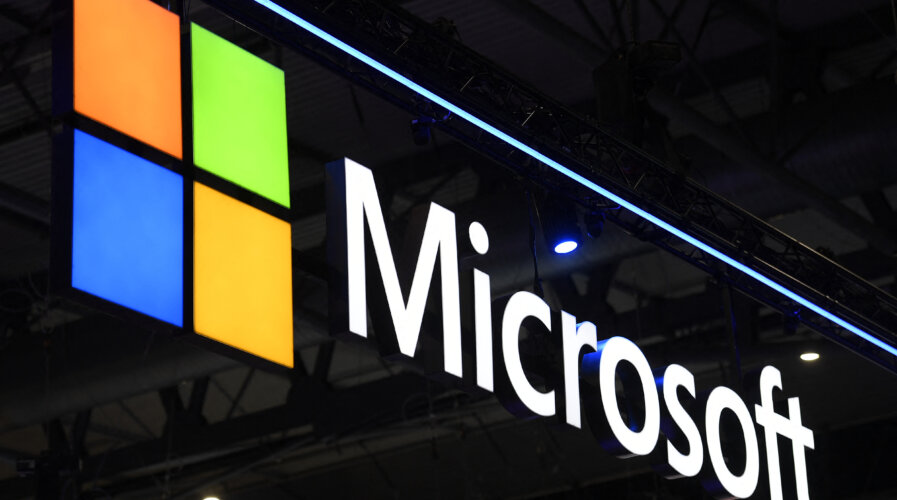
(Photo by Josep LAGO / AFP)
US requests moral responsibility from AI companies as Microsoft expands access to the public
CEOs of leading tech companies gathered to discuss the impact and regulation of artificial intelligence (AI) with US Vice President Kamala Harris. During the meeting, the US Vice President told the CEOs that they have a moral” responsibility to protect society from the potential dangers of AI.
Harris met at the White House with chief executives from Google, Microsoft, OpenAI and Anthropic. She said AI has “potential to improve people’s lives and tackle some of society’s biggest challenges.”
“As I shared today with CEOs of companies at the forefront of American AI innovation, the private sector has an ethical, moral, and legal responsibility to ensure the safety and security of their products,” Harris said in a statement.
“At the same time,” she warned, “AI has the potential to dramatically increase threats to safety and security, infringe civil rights and privacy, and erode public trust and faith in democracy.”
Harris said that she and President Joe Biden, who briefly dropped by the meeting, back “advancing potential new regulations and supporting new legislation.”
Public can now use Microsoft generative AI programs
Meanwhile, as the tech leaders discussed the technology in the White House, Microsoft expanded public access to its generative AI programs, despite fears that tech firms are rushing ahead too quickly with potentially dangerous technology.
The AI-enhanced features of Microsoft, which include Bing search engine and Edge internet browser, are now open for anyone to use, Yusuf Mehdi, corporate vice president, said in a blog post.
“This means that it will now be easier than ever for everyone to try the new Bing and Edge by simply signing into Bing with your Microsoft Account,” Mehdi said.
The services have been enhanced with the ability to work with images as well as text, and Microsoft intends to add video to the mix, according to the executive.
A Bing “Image Creator” was recently integrated into its AI chatbot’s repertoire, allowing it to generate visual, as well as written, content, Mehdi said.
“We are expanding Image Creator to all languages in Bing. So now you can create images in your native language,” he added.
On addressing the concerns towards AI, Mehdi stated, “As we’ve said from the beginning, responsible AI is at the center of every new experience we build with the new Bing and Edge. And getting the new Bing into preview so we can learn from real-world testing and feedback has been critical to our success and ability to expand the experience to more users.
We believe innovating and learning in the open is part of a responsible approach. But we don’t stop there. Together with our partners at OpenAI, we’ve continued to implement safeguards to defend against harmful content based on what we’re learning and seeing in preview. Our teams continue to work to address issues such as misinformation and disinformation, content blocking, data safety and preventing the promotion of harmful or discriminatory content in line with our AI principles.”
Risks from AI include its potential uses for fraud, with voice clones, deep-fake videos and convincing written messages.
A range of experts in March urged a pause in the development of powerful AI systems to allow time to make sure they are safe.
Their open letter, signed by more than 1,000 people, including billionaire Elon Musk and Apple co-founder Steve Wozniak, was prompted by generative AI technology from Microsoft-backed firm OpenAI.
“AI systems with human-competitive intelligence can pose profound risks to society and humanity,” the letter read.
“Powerful AI systems should be developed only once we are confident that their effects will be positive and their risks will be manageable,” it said.
Geoffrey Hinton, a prominent computer scientist often dubbed “the godfather of artificial intelligence” recently quit his job at Google to speak out about the dangers of the technology.
Hinton recently said at an MIT forum that it makes sense to halt the development of AI. But he added that the idea is naive given the intense competition between countries and companies involved in the sector.
Hinton, who created some of the technology underlying AI systems, maintained that the existential threat from AI is “serious and close.”
In the three months since AI-powered Bing and Edge were unveiled, more than half a billion chats have taken place, according to Mehdi.
Microsoft has so far seen people make more than 200 million images with Bing Creator software, Mehdi said.
“We believe innovating and learning in the open is part of a responsible approach,” he added.
“Our teams continue to work to address issues such as misinformation and disinformation, content blocking, data safety and preventing the promotion of harmful or discriminatory content in line with our AI principles.”
With additional reporting from Agence France-Presse
READ MORE
- Ethical AI: The renewed importance of safeguarding data and customer privacy in Generative AI applications
- How Japan balances AI-driven opportunities with cybersecurity needs
- Deploying SASE: Benchmarking your approach
- Insurance everywhere all at once: the digital transformation of the APAC insurance industry
- Google parent Alphabet eyes HubSpot: A potential acquisition shaping the future of CRM


